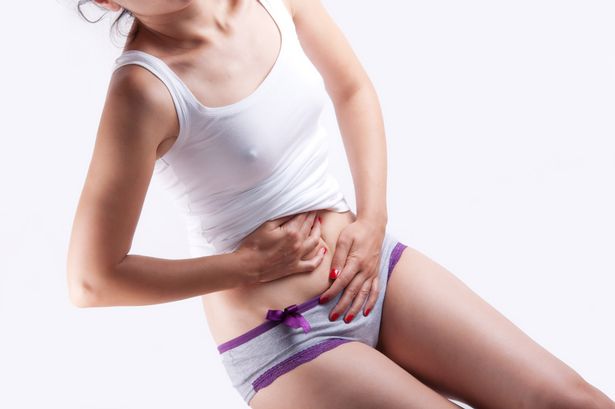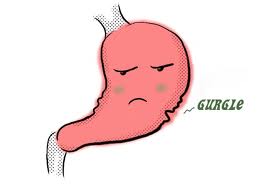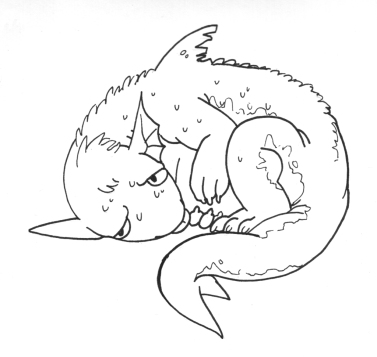
So you’ve started recovery from a restrictive eating disorder, and suddenly you’re experiencing tummy troubles: troubles you may or may not have been expecting. I know that when I started recovery, I was unprepared for the physical symptoms and did not attribute some of them to recovery process. I wish I’d known more: my mum and I were baffled when I started sweating so profusely at night that I was soaking the sheets through, and I thought I had Chronic Fatigue Syndrome at one point when I was unable to even sit up in bed I was so tired. Both of these are normal recovery symptoms (sweating lots indicates your metabolism speeding up, and exhaustion is your body telling you to rest and repair).
The first set of symptoms to normally occur, however, are those related to your digestive system: gas, bloating, constipation, diarrhoea, acid reflux, indigestion, partly digested food, abdominal pain, and having very frequent bowel movements. These symptoms are not fun, and they are certainly not comfortable. However, recovery is about persistence.

Restriction has a huge affect on the body, and with the digestive system, if it the body isn’t processing food regularly and consistently, it will stop wasting energy on working so efficiently. The digestive system slows down: a healthy person’s digestion rate is about 1.5 hours, whereas someone who has been starving themselves can have a digestion rate of 4 or 5 hours. This means that when you start to nourish your body with adequate and consistent energy, the digestive system will need a while to catch up. During the beginning of your recovery, because your digestive system will be working slower, food will sit in the stomach or bowel longer than it should do, which can result in abdominal distension, gas, and constipation. Or the body can go I’VE FORGOTTEN HOW TO PROCESS THAT, which can result in diarrhoea.
Restriction also can result in critical bacteria in the gut being reduced, and digestive enzyme levels being not as they should be, which also contributes towards digestive issues.
Wastage of muscles in the abdominal area can also cause distension as the muscles are not strong enough to hold things in more firmly when food is eaten. Do remember though that your stomach will distend slightly throughout the day naturally – the more food, the more your stomach will distend, and this normal and healthy. Those in recovery though will often find that the bloating and distension is far more extreme than that of a healthy person -and that is normal for the recovery process. Remember that your stomach has most likely shrunken during starvation, and will need to be stretched back to a normal size with refeeding. This is not going to be a great feeling, and it is likely to cause pain and tenderness.
The other thing to talk about is IBS and food sensitivities. During your eating disorder, your body can become unused to processing certain foods, for example, carbohydrates could be one. Dairy products could be another. This could lead you to think that you have a gluten or lactose intolerance if in recovery you start to reintroduce foods like bread, pasta, biscuits, cakes, and pastries, and/or ice cream, cheese, chocolate, and milk back into your diet and you get adverse digestive effects. However, this is generally not the case. If your body has become unused to processing foods that you have restricted for a long time, it is logical that it will now have to work up a tolerance again (like babies have to). It does not mean that you will be permanently intolerant. Abstaining from these foods that you are sensitive to will only mean that the body never gets used to processing it again. Refeeding and reintroducing these foods slowly into your diet – with the help of a doctor if the results are severe – will help your body develop a tolerance to them again and heal the gut. The same is true of IBS. Your doctor may have diagnosed you with IBS if tests for other conditions came back negative. Most of the time, sensitivities and IBS are resolved with refeeding, so give it time. Recovery requires patience and perseverance, so bear with the discomfort and keep on going. If after years, certain symptoms have not resolved themselves, then it is time to look for other causes, but this is fairly uncommon. Obviously if you have diagnosed food allergies or diseases/conditions such as Celiac disease, Crohn’s or ulcerative colitis, neuropathy disease, or have any obstruction in the GI tract, or have any other diagnosed medical condition that would be dangerous and cause damage to you if you were to increase certain foods/types of foods into your diet, then the paragraph above does not apply to you.
So, onto gas. This is probably the most awkward of the recovery symptoms. Smelly gas; loud gas; persistent gas; gas that wakes both you and your partner up with a start when you trump in the night (yes, that happened to me). It can feel embarrassing, but it’s one of the most common symptoms in recovery. If it happens in front of someone (which it probably will) just giggle about it. It may even help to pre-warn them if you are happy to let that person know that you are in recovery from a restrictive eating disorder. It means that they will be expecting it and you can laugh about it (which you can do even if it is a surprise). Everyone farts- you’re just going to be letting off wind a hell of a lot more than the average person for a while.
Frequent bowel movements are also normal. This can be a sign of your digestive system speeding up. I went to the toilet to poop up to seven times in a day for a while (yup, really). If your bowel movements are loose, this could be the I’VE FORGOTTEN HOW TO PROCESS THAT from above.
It is important to continue to eat, even when it is the last thing that you want to do. If you are experiencing a lot of pain, then it is okay to give yourself a break and eat when it feels more tolerable, but discomfort and slight pain is normal and it is important to eat adequately and consistently. However, if you are worried about any symptoms that you are experiencing, please see a doctor to determine if there is anything other than the normal recovery process going on in your body.
So how do you deal with these recovery symptoms?
Firstly, if you are experiencing constipation, eating fats can help move things along. Getting some fibre never goes amiss to prevent it from happening, but this is recovery, so doing healthy people things won’t necessarily work. Warm water is also extremely helpful for constipation – I’d never heard of it before but it has saved me a couple of times. If your stomach is not feeling so great, herbal teas can help settle it, and a hot water bottle can help ease pain or discomfort. For acid reflux and indigestion, there are over the counter medications that you could use, or you can visit your doctor for other options.
I know it sucks, but don’t give up – these symptoms do not last forever. Be patient, and stay on course. Keep moving forwards. As Churchill once said “If you’re going through hell, keep going.” You will come out the other side.

